-
 Bitcoin
Bitcoin $107,352.1067
0.28% -
 Ethereum
Ethereum $2,429.3531
-0.90% -
 Tether USDt
Tether USDt $1.0001
-0.02% -
 XRP
XRP $2.1894
4.62% -
 BNB
BNB $646.7968
0.36% -
 Solana
Solana $147.4290
4.03% -
 USDC
USDC $0.9998
-0.02% -
 TRON
TRON $0.2756
1.52% -
 Dogecoin
Dogecoin $0.1630
1.14% -
 Cardano
Cardano $0.5612
1.18% -
 Hyperliquid
Hyperliquid $37.0580
-0.05% -
 Bitcoin Cash
Bitcoin Cash $496.9410
-0.09% -
 Sui
Sui $2.7318
3.19% -
 Chainlink
Chainlink $13.1503
0.58% -
 UNUS SED LEO
UNUS SED LEO $9.0766
0.55% -
 Avalanche
Avalanche $17.7220
1.46% -
 Stellar
Stellar $0.2380
1.52% -
 Toncoin
Toncoin $2.8439
0.38% -
 Shiba Inu
Shiba Inu $0.0...01143
1.84% -
 Litecoin
Litecoin $85.8053
1.47% -
 Hedera
Hedera $0.1483
2.70% -
 Monero
Monero $314.3240
2.12% -
 Bitget Token
Bitget Token $4.6725
0.77% -
 Dai
Dai $1.0000
0.00% -
 Polkadot
Polkadot $3.3555
1.28% -
 Ethena USDe
Ethena USDe $1.0001
0.02% -
 Uniswap
Uniswap $7.0890
2.64% -
 Pi
Pi $0.5355
-3.40% -
 Pepe
Pepe $0.0...09393
1.06% -
 Aave
Aave $256.8136
-1.90%
How to create a Bitcoin wallet address on Trust Wallet?
To generate a Bitcoin address on Trust Wallet, download the app, select Bitcoin, create a wallet, and tap 'Receive' to view your unique address.
Mar 31, 2025 at 01:07 pm
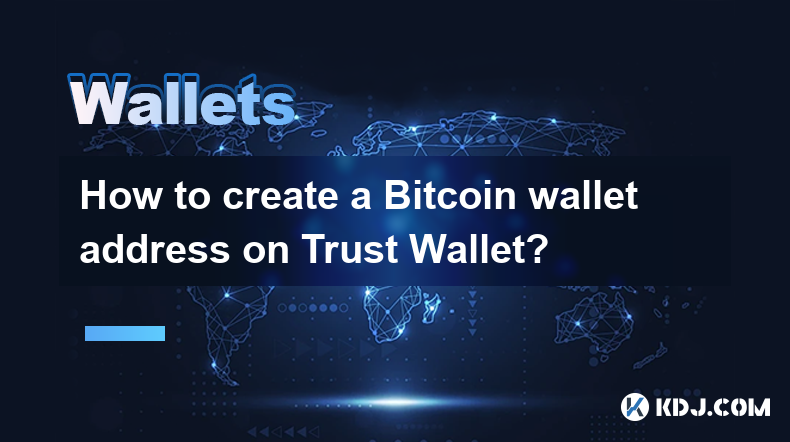
Understanding Bitcoin Wallet Addresses and Trust Wallet
Before diving into the process, let's clarify what a Bitcoin wallet address is and Trust Wallet's role. A Bitcoin wallet address is a unique identifier, like a bank account number, used to receive and send Bitcoin. Trust Wallet is a popular mobile cryptocurrency wallet that supports Bitcoin and many other cryptocurrencies. It provides a user-friendly interface for managing your digital assets, including creating Bitcoin addresses. Understanding this distinction is crucial before proceeding.
Step-by-Step Guide: Generating a Bitcoin Wallet Address on Trust Wallet
Creating a Bitcoin address within Trust Wallet is straightforward. Here's a step-by-step guide:
Download and Install Trust Wallet: First, download the official Trust Wallet app from the Google Play Store (Android) or the Apple App Store (iOS). Ensure you're downloading from the official source to avoid malicious apps.
Open the App and Select Bitcoin: After installation and launching the app, you'll see a list of supported cryptocurrencies. Locate and select Bitcoin (BTC).
Create a New Wallet (If Necessary): If this is your first time using Trust Wallet, you'll be prompted to create a new wallet. Follow the on-screen instructions, which typically involve setting up a secure password and backing up your seed phrase. This seed phrase is critically important; lose it, and you lose access to your Bitcoin.
Access Your Bitcoin Wallet: Once your Bitcoin wallet is created, you'll be taken to your wallet overview. This screen will display your Bitcoin balance (initially zero) and provide options for sending and receiving Bitcoin.
View Your Bitcoin Address: To view your Bitcoin address, look for a button or icon usually labeled "Receive," "Deposit," or a similar term. Tapping this will reveal your unique Bitcoin address. This address is what you'll provide to others when receiving Bitcoin.
Understanding the Security of Your Bitcoin Wallet Address
Your Bitcoin address itself isn't inherently secret; it's like your email address. However, the security of your Bitcoin lies in the private key associated with that address. This private key, which is derived from your seed phrase, allows you to spend the Bitcoin associated with the address. Never share your seed phrase or private key with anyone. Trust Wallet employs robust security measures to protect your private keys, but maintaining good security practices is essential.
Different Types of Bitcoin Addresses and Their Implications
While Trust Wallet primarily uses SegWit addresses (bech32 format, starting with "bc1"), it's important to be aware of different address formats. Older addresses (legacy addresses) begin with "1" and are less efficient. Understanding the differences isn't critical for basic usage, but it's good to be aware that different exchanges or platforms might prefer certain address types. Always use the address provided by the receiving party.
Troubleshooting Common Issues
Wallet Creation Issues: If you encounter problems creating your wallet, double-check your internet connection and ensure you're using the latest version of the Trust Wallet app. If the problem persists, consult Trust Wallet's support resources.
Address Not Showing: If you can't locate your Bitcoin address, look for options like "Receive," "Deposit," or a similar button within your Bitcoin wallet section. The location might vary slightly depending on the app version.
Seed Phrase Backup: Always back up your seed phrase and store it securely in a safe, offline location. Never store it digitally or in easily accessible places.
App Updates: Regularly update your Trust Wallet app to benefit from the latest security patches and improvements.
Advanced Features and Considerations
Trust Wallet offers additional features related to Bitcoin management, such as connecting to decentralized exchanges (DEXs) to trade Bitcoin. However, using these features requires a deeper understanding of cryptocurrency and associated risks. Begin with the basics before exploring more advanced functionalities.
Importance of Security Best Practices
Remember, the security of your Bitcoin depends heavily on your actions. Avoid phishing scams, use strong passwords, and never share your seed phrase or private key. Regularly review your transaction history and monitor your wallet for any suspicious activity.
Frequently Asked Questions
Q: Is it safe to use Trust Wallet for Bitcoin?
A: Trust Wallet is a reputable and widely used wallet, but like any digital wallet, it's crucial to practice good security habits. Keep your seed phrase safe, use a strong password, and be wary of phishing attempts.
Q: Can I create multiple Bitcoin addresses within Trust Wallet?
A: No, you don't create multiple addresses. Each Bitcoin wallet in Trust Wallet has one address. You can receive Bitcoin to that single address, and you can send Bitcoin from that address. However, you can create multiple wallets within Trust Wallet, each with its own Bitcoin address if needed for better organization.
Q: What happens if I lose my seed phrase?
A: Losing your seed phrase means losing access to your Bitcoin. There's no way to recover it. This is why securely backing up your seed phrase is paramount.
Q: Can I use Trust Wallet on multiple devices?
A: You can access your Trust Wallet account on multiple devices, but it's generally recommended to use it on a limited number of trusted devices to minimize security risks. You may need to re-enter your password or use biometric authentication each time.
Q: What is the difference between a Bitcoin address and a private key?
A: Your Bitcoin address is public and used to receive Bitcoin. Your private key is secret and allows you to spend the Bitcoin received at that address. Never share your private key.
Q: How often should I back up my seed phrase?
A: It's good practice to back up your seed phrase immediately after creating your wallet and then periodically to ensure you have multiple secure copies in different locations.
Disclaimer:info@kdj.com
The information provided is not trading advice. kdj.com does not assume any responsibility for any investments made based on the information provided in this article. Cryptocurrencies are highly volatile and it is highly recommended that you invest with caution after thorough research!
If you believe that the content used on this website infringes your copyright, please contact us immediately (info@kdj.com) and we will delete it promptly.
- Pi2Day Disappointment: Why the Pi Network Community Is Losing Faith
- 2025-06-28 18:30:12
- Silver Lining: Robert Kiyosaki's July 2025 Silver Prediction
- 2025-06-28 18:30:12
- Gotta Go Fast! Sonic Speeds into Magic: The Gathering Secret Lair
- 2025-06-28 18:50:12
- Bitcoin Price Swings: Navigating Volatility and Predicting the Future
- 2025-06-28 19:10:14
- Meme Coins in 2025: Will Shiba Inu Make a Comeback?
- 2025-06-28 19:30:12
- Pi Network's AI App Studio and Staking Utility: Revolution or Red Herring?
- 2025-06-28 19:30:12
Related knowledge

How to stake cryptocurrencies on Coinbase? Benefits and risks
Jun 27,2025 at 06:36pm
Understanding Cryptocurrency Staking on CoinbaseStaking cryptocurrencies involves locking up digital assets to support the operations of a blockchain network, typically in return for rewards. Coinbase, one of the most popular cryptocurrency exchanges globally, offers staking services for several proof-of-stake (PoS) coins. Users can stake their holdings...

How to contact Coinbase customer service? Support channels and response times
Jun 28,2025 at 01:29pm
Contacting Coinbase Customer Service: Support Channels and Response TimesIf you're a user of Coinbase, reaching their customer service team may become necessary for various reasons, such as account verification issues, transaction disputes, or technical difficulties. Understanding the different support channels available and what to expect in terms of r...
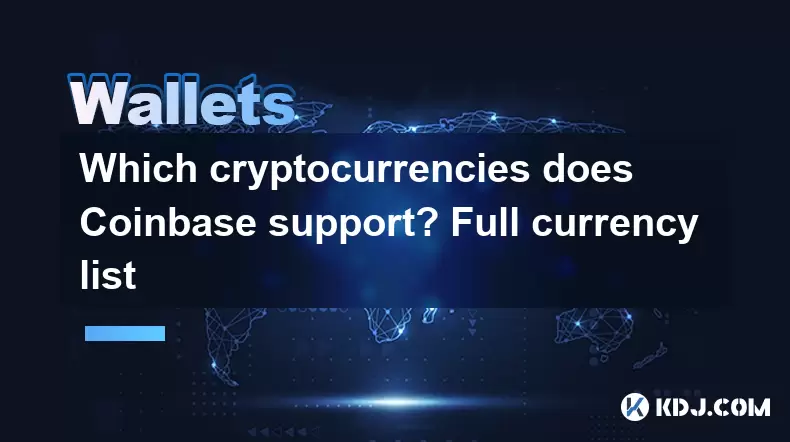
Which cryptocurrencies does Coinbase support? Full currency list
Jun 28,2025 at 08:36am
Overview of Cryptocurrencies Supported by CoinbaseCoinbase is one of the most popular and trusted cryptocurrency exchanges globally. It provides users with a platform to buy, sell, trade, and store various digital assets. As of the latest updates, Coinbase supports over 200 cryptocurrencies, including major ones like Bitcoin (BTC), Ethereum (ETH), and L...
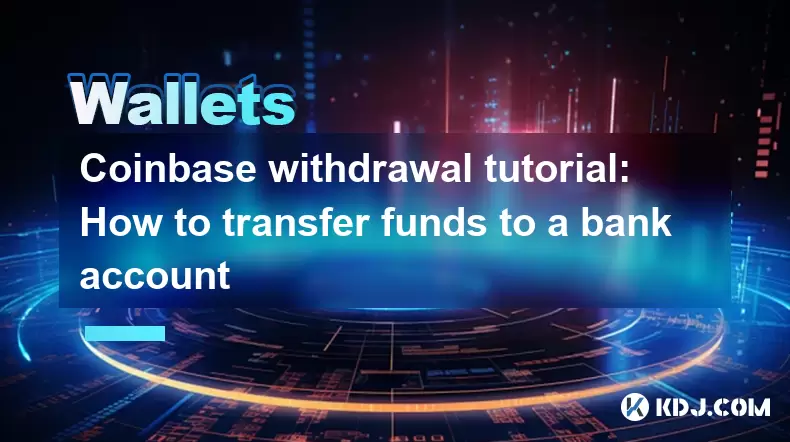
Coinbase withdrawal tutorial: How to transfer funds to a bank account
Jun 28,2025 at 02:35am
Understanding Coinbase WithdrawalsCoinbase is one of the most widely used cryptocurrency platforms, allowing users to buy, sell, and store digital assets. Once you've successfully traded or held your crypto on Coinbase, the next logical step may be to withdraw funds to a bank account. This process involves converting your cryptocurrency into fiat curren...
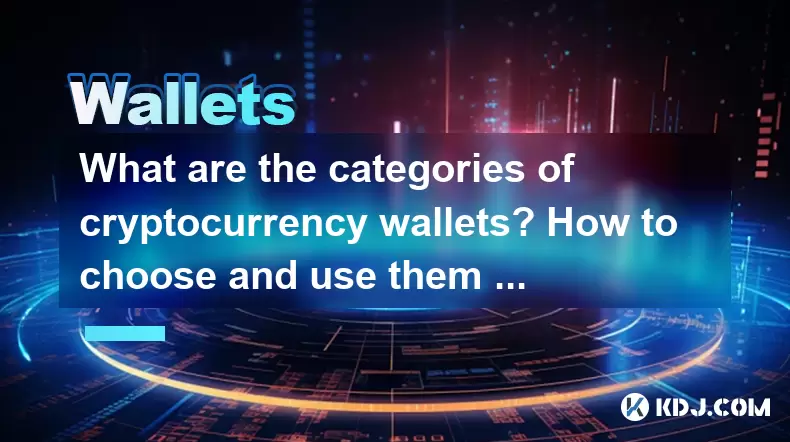
What are the categories of cryptocurrency wallets? How to choose and use them safely?
Jun 21,2025 at 10:42pm
Understanding Cryptocurrency WalletsCryptocurrency wallets are essential tools for anyone involved in the digital asset ecosystem. They allow users to store, send, and receive cryptocurrencies securely. Unlike traditional wallets that hold physical money, crypto wallets manage cryptographic keys—private and public—which interact with blockchain networks...
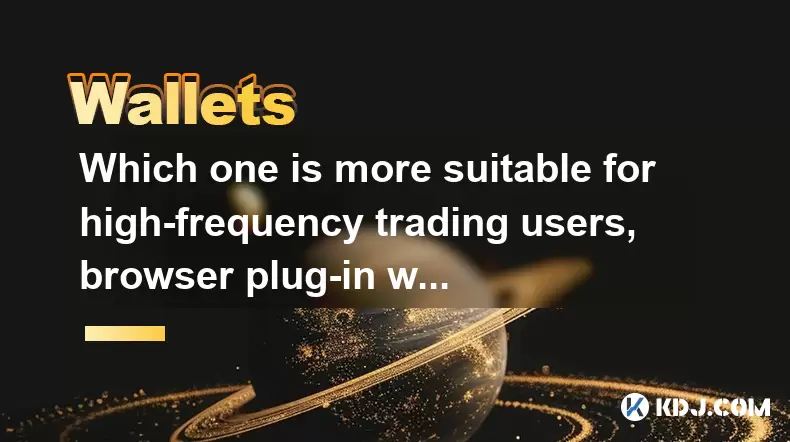
Which one is more suitable for high-frequency trading users, browser plug-in wallets or independent application wallets?
Jun 23,2025 at 08:22am
Understanding the Role of Wallets in High-Frequency TradingFor high-frequency trading (HFT) users in the cryptocurrency market, wallet selection is critical due to the need for speed, security, and seamless integration with trading platforms. HFT involves executing a large number of trades within seconds or even milliseconds, which demands a wallet that...

How to stake cryptocurrencies on Coinbase? Benefits and risks
Jun 27,2025 at 06:36pm
Understanding Cryptocurrency Staking on CoinbaseStaking cryptocurrencies involves locking up digital assets to support the operations of a blockchain network, typically in return for rewards. Coinbase, one of the most popular cryptocurrency exchanges globally, offers staking services for several proof-of-stake (PoS) coins. Users can stake their holdings...

How to contact Coinbase customer service? Support channels and response times
Jun 28,2025 at 01:29pm
Contacting Coinbase Customer Service: Support Channels and Response TimesIf you're a user of Coinbase, reaching their customer service team may become necessary for various reasons, such as account verification issues, transaction disputes, or technical difficulties. Understanding the different support channels available and what to expect in terms of r...

Which cryptocurrencies does Coinbase support? Full currency list
Jun 28,2025 at 08:36am
Overview of Cryptocurrencies Supported by CoinbaseCoinbase is one of the most popular and trusted cryptocurrency exchanges globally. It provides users with a platform to buy, sell, trade, and store various digital assets. As of the latest updates, Coinbase supports over 200 cryptocurrencies, including major ones like Bitcoin (BTC), Ethereum (ETH), and L...

Coinbase withdrawal tutorial: How to transfer funds to a bank account
Jun 28,2025 at 02:35am
Understanding Coinbase WithdrawalsCoinbase is one of the most widely used cryptocurrency platforms, allowing users to buy, sell, and store digital assets. Once you've successfully traded or held your crypto on Coinbase, the next logical step may be to withdraw funds to a bank account. This process involves converting your cryptocurrency into fiat curren...

What are the categories of cryptocurrency wallets? How to choose and use them safely?
Jun 21,2025 at 10:42pm
Understanding Cryptocurrency WalletsCryptocurrency wallets are essential tools for anyone involved in the digital asset ecosystem. They allow users to store, send, and receive cryptocurrencies securely. Unlike traditional wallets that hold physical money, crypto wallets manage cryptographic keys—private and public—which interact with blockchain networks...

Which one is more suitable for high-frequency trading users, browser plug-in wallets or independent application wallets?
Jun 23,2025 at 08:22am
Understanding the Role of Wallets in High-Frequency TradingFor high-frequency trading (HFT) users in the cryptocurrency market, wallet selection is critical due to the need for speed, security, and seamless integration with trading platforms. HFT involves executing a large number of trades within seconds or even milliseconds, which demands a wallet that...
See all articles
























































































